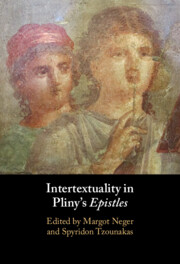Book contents
- Intertextuality in Pliny’s Epistles
- Intertextuality in Pliny’s Epistles
- Copyright page
- Contents
- Contributors
- Acknowledgements
- Abbreviations
- Introduction
- Part I Intertextuality and Interdiscursivity in Pliny’s Letters
- Part II Models and Anti-Models: Pliny’s Interaction with Oratory and Natural History
- Part III Pliny and Seneca: Discourses of Grief and Posthumous Reputation
- Part IV Pliny’s Villas and Their Poetic Models
- Chapter 9 The Villa and the Monument: Horace in Pliny, Epistles 1.3
- Chapter 10 The Villas of Pliny and Statius
- Part V Pliny Turns Nasty: Satire and the Scoptic Tradition
- Part VI Final Thoughts: Discourses of Representation and Reproduction
- Bibliography
- General Subject Index
- Index Locorum
Chapter 10 - The Villas of Pliny and Statius
from Part IV - Pliny’s Villas and Their Poetic Models
Published online by Cambridge University Press: 07 September 2023
- Intertextuality in Pliny’s Epistles
- Intertextuality in Pliny’s Epistles
- Copyright page
- Contents
- Contributors
- Acknowledgements
- Abbreviations
- Introduction
- Part I Intertextuality and Interdiscursivity in Pliny’s Letters
- Part II Models and Anti-Models: Pliny’s Interaction with Oratory and Natural History
- Part III Pliny and Seneca: Discourses of Grief and Posthumous Reputation
- Part IV Pliny’s Villas and Their Poetic Models
- Chapter 9 The Villa and the Monument: Horace in Pliny, Epistles 1.3
- Chapter 10 The Villas of Pliny and Statius
- Part V Pliny Turns Nasty: Satire and the Scoptic Tradition
- Part VI Final Thoughts: Discourses of Representation and Reproduction
- Bibliography
- General Subject Index
- Index Locorum
Summary
This chapter argues that Pliny’s description of his Tuscan villa (Ep. 5.6) engages in a complex intertext with Statius’ villa descriptions in the Silvae (1.3 and 2.2). The intertext involves Pliny recognizing and ‘correcting’ Statius’ combinatorial appropriation of Lucretius and Vergil’s Georgics. Statius alludes to the concept of nature in Lucretius and Vergil in order to justify his (polemical) celebration of the domination of nature by positioning it within the didactic tradition. In doing so Statius is able to praise the extravagance of his patrons and their villas. Chinn argues that Pliny acknowledges and elaborates this intertext by ‘correcting’ Statius’ Lucretian allusion and thereby positioning himself as the controller of nature and hence the object of praise.
- Type
- Chapter
- Information
- Intertextuality in Pliny's Epistles , pp. 200 - 216Publisher: Cambridge University PressPrint publication year: 2023

